Edgar, January of this year saw the re-release of the old Harvest LPs as a 4CD box-set. Did you have any part in that or did Harvest/EMI just decide to dust off some of its back catalogue to see how much interest it was likely to attract?
That ‘s kind of what they did, with the addition of the Hyde Park live stuff which had been lying around for years, obviously. The only hand we really had in it was that we were given a choice of sleeves and art direction and various sleeves. We didn’t like the first one so they did some more, and we picked one of those, and we were interviewed – there’s an interview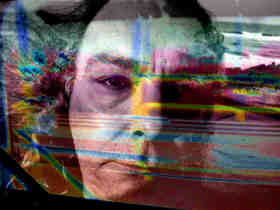 in the liner notes, with myself and Steve (Broughton, drums), mostly about the old Harvest years and that was about it really, that was our only involvement. Actually no, Steve and Arthur (Grant, bass guitar) went to the mastering session at Abbey Road, to check the live stuff. in the liner notes, with myself and Steve (Broughton, drums), mostly about the old Harvest years and that was about it really, that was our only involvement. Actually no, Steve and Arthur (Grant, bass guitar) went to the mastering session at Abbey Road, to check the live stuff.
You hear of acts whose old and often best known material gets recycled and for whatever reason (usually the bad contract they signed in the first place) receive little or no financial reward as a result. Cheeky of me to ask maybe but do you stand to benefit from the reissue
The thing with EMI is that when we signed to them we didn’t have any advances, we left all that out. That’s usually, what bands spend the rest of their lives paying for. The royalties that EMI paid were miniscule. It was about the same as the Beatles and which is why they kicked off so much about all that. They’re a very mean company but an honest one in so far as we always had royalties and of course our publishing was done very neatly so we still get publishing royalties as well. It’s not a fortune by any stretch but yeah, we get what we are entitled to under the terms of the contract.
Well you can’t say fairer than that
No not really, especially not in the rock ‘n ‘roll business (laughs)
Bearing in mind then that your fellow band members were present at the mastering were you pleased with the outcome?
Er yeah, I suppose so. Re-mastering always gives a certain something to stuff and given the quality that it was originally then yeah I guess they’ve done a good job as always. There was a guy called Pete Mew, who was an engineer at Abbey Road and he recorded most of our early stuff. Well he’s a re-mastering engineer now so he gets to have a second crack at it.
Given that a lot of this stuff is 40 years old and more, how does it sound to you now?
Oh well some of it sounds a bit dated of course, it sounds of its time. I was surprised by the energy of it though, and that’s good. There’s still a lot that sounds relevant and stands up, and then there’s some of it that’s so of its time it’s almost not even very interesting anymore, at least not to me, personally, you know.
We’ve tou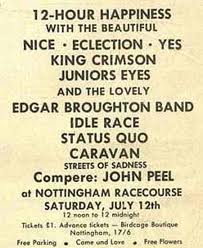 ched on the previously unreleased recording of the 45 minute slot in support of Pink Floyd at Hyde Park and which features on the box set. Where did that appear from all of a sudden? ched on the previously unreleased recording of the 45 minute slot in support of Pink Floyd at Hyde Park and which features on the box set. Where did that appear from all of a sudden?
I don’t know, there’s film as well. The album they brought out “Live at Abbey Road”, we were one of the first bands ever to record a session with an audience there, and that languished in the vaults until a couple of years ago. I’ll be honest, I think they get to the end of a box full of stuff and then they say let’s go and have another look
And that’s when they find all those lost recordings and additional tracks and early takes that clog up the otherwise empty space on CDs?
Yeah, that’s it (laughs).
Unlike Punk, which led to an explosion of DIY indie labels, the majority of “hip” labels a decade or so earlier were mere subsidiary imprints of majors (in Harvest’s case, EMI). As a result did these labels tend to be viewed with suspicion by the “hipper” more radical acts?
Do you mean with Harvest? No there was a queue! We were fortunate in that our manager, Pete Jenner, Blackhill Enterprises was very involved with EMI, Pete could hustle so he’d have an idea, I’m sure he went along to them and said “you should do this underground label” and other people were probably on the same lines so, yeah he was involved in that. We were one of the first bands on, with other Blackhill artists, but once it started...put it this way, had it started four or five years earlier and we were still in Warwick, we’d have killed to be on Harvest, we’d have looked in the adverts in Melody Maker and thought wow, Principal Edwards Magic Theatre, Third Ear Band , let’s get down there, but we were already there by then. I imagine there must have been young bands and maybe not so young bands thinking if we can get on Harvest that would be a coup!
You mentioned moving down from Warwick and you probably landed in London right time and right place, Notting Hill/Ladbroke Grove being the UK’s answer to Haight Ashbury. I’m interested in your take on that – some of us who weren’t there look upon it as a golden time of great community spirit. Was that your recollection of things?
Yes, a lot of it. Of course what has to be remembered was 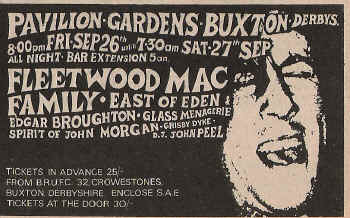 there were a lot of people out of their mind on various substances and of course some of those substances aren’t conducive to good social behaviour, and so there were all kinds of overdoses and people really tripped out, but that was kind of about it, you know? You’d get some unpleasantness because someone was out of their head all of the time. But the community thing, the fellowship and brother/sister sort of thing was actually quite real and it was good. People were friendly, you’d walk down the street and people would say “hi” and “peace”. I suppose it was like a lot of situations. If you looked behind the doors of an evening there would probably still be the same domestic violence and all the kind of things that go wrong in society, but on the street and particularly on a nice sunny day like today, it was a very pleasant place to be. there were a lot of people out of their mind on various substances and of course some of those substances aren’t conducive to good social behaviour, and so there were all kinds of overdoses and people really tripped out, but that was kind of about it, you know? You’d get some unpleasantness because someone was out of their head all of the time. But the community thing, the fellowship and brother/sister sort of thing was actually quite real and it was good. People were friendly, you’d walk down the street and people would say “hi” and “peace”. I suppose it was like a lot of situations. If you looked behind the doors of an evening there would probably still be the same domestic violence and all the kind of things that go wrong in society, but on the street and particularly on a nice sunny day like today, it was a very pleasant place to be.
Did that spirit of cordiality and communality extend to the bands, so did you hang around together or was there more of a competitive edge?
It’s quite interesting, Mick Farren in a particular piece he wrote described one of the Hyde Park concerts that they (the Deviants) played and he said they were trying to work out how they could get one over on us, or words to that effect, because although it was all peace and love, bands were still competitive and wanted to be the best on the day. Bless him though he said we had this thing called “Our Demons Out” and there was nothing to be done about it. In actual fact what he forgot to say was that they were shit, they really were. I don’t think Mick Farren’s been near anything half-decent in his life, musically speaking, I mean he’s a journalist - he should have been a journalist all the time because he can’t sing to save his life. And you can say I said that. He reviewed the Box Set and described it as inane hippie nonsense! He’s not my mate (laughs) he never was.
Do you still see those old bands about the place - is there some kind of “friends reunited” for old scenesters?
No not really. We bump into people once in a while – Tony McPhee and the Groundhogs, Pretty Things, there’s a few band we see and most bands we’re friendly with. We were coming back from Germany and we bumped into Uriah Heep, who we’d not seen for twenty odd years, and it was really nice, so that happens you know, but no, we were never were much of a band for going out and doing the party thing.
You mentioned the Hyde Park concerts and of course there were a lot of legendary events at the time, most of which you seemed to be involved with - Glastonbury Fayre and Phun City, for example. Which of these do you most indentify with now – which of them has lived in the memory?
Oh Hyde Park, with Blind Faith. That was huge! We’d gone from playing to two hundred people in a pub or whatever to this massive, massive audience as far as the eye can see. I’d never seen an audience like that and so you could never forget that, just a sea of faces. I can remember walking back through Piccadilly and there were dozens and dozens of people coming up and saying sign this and sign this and it was quite a shock because it ne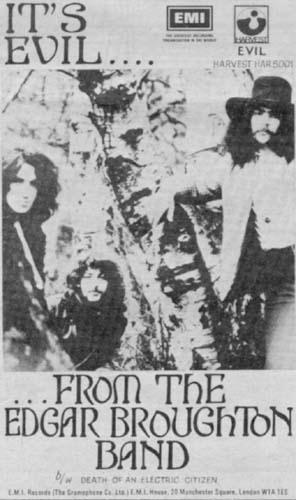 ver really happened to us on that level. Glastonbury Fayre was pretty amazing too, with the Pyramid stage. I’m doing it this year on my own on the 71 stage, not sure what day yet. ver really happened to us on that level. Glastonbury Fayre was pretty amazing too, with the Pyramid stage. I’m doing it this year on my own on the 71 stage, not sure what day yet.
Oh yes of course it’s another Glastonbury themed anniversary year, 1971 and all that
Yes that’s right, I’m doing that, and Arthur Brown and a few other old favourites will be there, but the festivals were always really good fun. Honestly though I’ve never been to a festival unless I’ve been playing.
Really?
Don’t fancy it (laughs)! It’s true, if I was younger I would have.
I used to love them, now it’s a case of think of my back, and what are the toilets going to be like...
Yes, exactly! So I’m unlikely to start going to festivals now unless I’m on the bill, but no, great times and great memories I must say.
Can you satisfy my curiosity on a couple of issues? One, did your Mum really drive the band’s tour bus...
Yes she did, although I wouldn’t call it a “tour bus” back in the day. It was a little Morris JT van that eventually turned into a transit, but yes she drove us around and my Dad helped with the equipment, I mean he did all kinds of things and between them they were fabulous. When most people were telling us to get our hair cut, Mum and Dad were saying “don’t you get your hair cut you’ll spoil your image”
Supportive parents, that’s what you want, right?
They were great! John Peel always used to make a bee-line for our van at festivals because he’d get a cup of tea and a sandwich. They were quite well known in their own way. When we came to London although Joyce and Dennis were still involved she didn’t drive for us anymore.
Excellent stuff! Secondly, and this one comes from a work colleague who reckoned she inspired her to take to the road, but did you at one stage have a female roadie called Jane?
Actually we had two female roadies who had this rather cute name they called themselves but I can’t remember what it was and I don’t recall if one of them was called Jane. They were quite pretty, with hot pants and fishnet tights and that sort of thing. The only problem was, I remember we did a free gig for the Socialists – I remember (Tony) Benn (former UK government minister and left-wing grandfather figure) and a few other firebrands were there it was at the Hammersmith Palais. One of these girls came over to me during the gig and said “I think one of the amplifiers is burning” and I looked around and there was all this smoke coming out. Unfortunately that’s all she could do, and of course the guys had to carry all of the heavy gear. It was a bit of gimmick really. They cam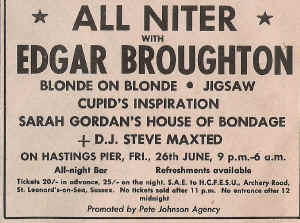 e to Northern Ireland with us back in the days when no-one else would play there and they got a bit scared by that, after which we sort of parted company. They looked great, though, and I wish I could remember what they called themselves. e to Northern Ireland with us back in the days when no-one else would play there and they got a bit scared by that, after which we sort of parted company. They looked great, though, and I wish I could remember what they called themselves.
Well maybe it’s something to Google. Perhaps there’s someone out there reading this who knows the answer
Oh, I’m sure there is.
Back briefly to Harvest, then. You left the label after 1973’s “Oora”. Why was that?
Do you know, I’m not really sure! We left Blackhill not long after that. That wasn’t really a smart move but I think it had all run its course by then.
Do you have fond memories of your time there?
Oh yes, definitely. Working at Abbey Road was unbelievable. Imagine a band of our status and potential getting unlimited studio time at Abbey Road. I don’t think anyone would get that today even if they were prepared to pay for it. Times really have changed.
The mid-70s onwards was a tough time for the old guard with the coming of punk. Anyone but the most nimble of thought and deed tended to get lumped in with the old guard and who were derided accordingly. How did the Broughtons fare in this climate?
I think all of us were on the back foot a little bit. We just beavered away doing what we did. We didn’t really acknowledge any of it musically, but we were already described as “proto-punks” by then so we just carried on. I found punk music a bit like country music -it’s mostly rubbish, but if you work your way through it then every now and again you find a little diamond. In that respect punk was quite extraordinary. Mind you I expect they said that about what was called underground music or “prog rock” although I was never very happy with that term, I don’t think we were ever that.
Most people would be more familiar with your earlier output, give us a potted history of what you got up to in the 80s and 90s to keep body and soul together?
I was working as a part time youth and community worker. It sort of happened accidentally, my partner was already working in that area and had this boss called Jane Shuttleworth, an extraordinary woman and one of the most influential people in my life. It was all quite progressive and political. We all had kids or other stuff going on and so staff meeting would be held alternately in people’s houses. When it was our turn and once Luke [Edgar’s son] was in bed, I’d come and make tea, sit down and start chatting with them. Then one day Jane said “look why don’t you come and put your money where your mouth is and come and work with some of our kids”, and so I started with a Tuesday afternoon music workshop for an unemployment group, where under the guise of getting a few instruments out and having a bit of a jam session we looked at people’s needs and tried to get them resourced. And then that went on and on and on and I ended up getting quite involved. Then in the 90s we then ran a radio station called Fundamental FM for young people, which was the first radio station in the country which was run by young people and was legal. Although we oversaw things it really was run by young people. We won the first Philip Lawrence Award for Crime Prevention, we were on Breakfast TV and all that stuff so that was quite good fun and we ran that for about eight years in the summer. A couple of year ago I was moved somewhere from the studio and it didn’t work out and there were a few problems for me personally. In that period apart from getting together once in a while for a few gigs and some recording of course – we did “Parlez-Vous English” and “Superchip” in that period – it was mostly working with people and I really enjoyed that, extremely.
That’s interesting because a lot of people might have found trouble in adjusting to another career having had a taste of the limelight but that doesn’t seem to have bothered you.
Well no, we’d still play a few gigs and then there’d be no gigs for a while and I got into it and after a couple of years it was like “oh, I’ve got to rehearse for these gigs” but in the in between times I wasn’t really bothered
One gig you did play a couple of years back was the Aylesbury Friars 40th Anniversary Concert together with the aforementioned Groundhogs and Pretty Things. I’ve seen the set list and it looks cracking. Was that a good experience for you?
It was absolutely stunning! I don’t say that often about myself, but the band that night was absolutely top notch, so much so that the guys who were running it came up to us afterwards and said wow that was a surprise. They really didn’t think we’d be anywhere near as good as that. And then we did another one not long after that in Leamington Spa and that was exactly the same, really, really, good.
Two things that are very evident looking at your website (www.edgarbroughton.com) are that firstly you appear to be just as strongly committed to left wing and libertarian causes as you were back in the day, and that you have hit upon a novel and ethical way of gigging.
Turning to the first of these, you are very much involved in fighting the cuts to public expenditure imposed (some would argue somewhat gleefully be a government that relies on more than 50% of funding from city institutions) and were caught up in the infamous “ke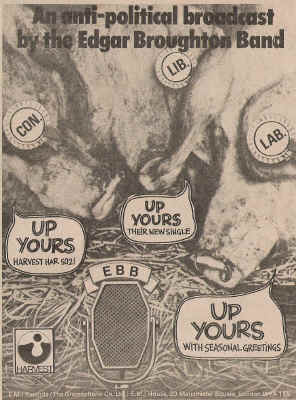 ttling” episode a while back. Describe for us that incident and how it came about? ttling” episode a while back. Describe for us that incident and how it came about?
Well it was the students’ demo against increased tuition fees. I got there about 20 minutes before the student march arrived. There were quite a few people in the square and already riot police in position. The students were still filing into the square when cordons of the square were blocked off by police and we were informed we wouldn’t be able to leave. I asked “are we kettled?” and was told “no you just can’t go anywhere. Well all kinds of things happened as a result of that and then at one point we were told that we could walk up towards Trafalgar Square, up past the Cenotaph and we were no longer kettled. We get half way up and a line of cavalry – mounted police officers –pushed us back, and I mean pushed us back. They’d already had their arses kicked in a corner of the square with fireworks and one guy had fallen off his horse and gets kicked, and they’re actually attacking the crowd and there was no need to do that. Anyway they had to retreat, and I reckon they came to get their own back. I was begging coppers and saying that there’s people older than me there. I saw some terrible stuff. They kept us there for best part of 8 hours. They said we could leave, we got on to Westminster Bridge and they kettled us again. There was no reason, nothing else had happened, it’s just that wind was blowing nicely from the east, down the river, and they wanted to freeze us. And then after a 3 hours there they allowed us to go to Waterloo, which was where I was headed, The moment we came off the bridge on the south bank of Westminster Bridge there was a gauntlet of police all the way to Waterloo Station all taking photographs, making all sorts of cracks. Look there’s only a minority, most of them are alright but kettling’s a very divisive, nasty thing, and when it’s administered in the way it was that day it borders on torture, it certainly infringes on civil liberties and I think it’s illegal.
During the 1960s and 1970s a lot of musicians were politically active for want of a better expression and were unafraid to nail their colours to the mast. You had benefits for this and that, anti-Vietnam marches, Rock Against Racism and so on. Then from the 1980s onwards you had Live Aid and a lot of high profile, career enhancing stuff and not very much else. What do you put this change down to?
It was Thatcher’s time, It was get what you can while you can, buy your own house even if you lose it a few years later. It was all about me, me, me, and there is no such things as society, there are only individuals. My son fortunately grew up in a household where we had no truck with that but his generation – he’s 30 now – was very much depoliticised, and it’s only recently that there’s been something to actually fight over. A lot of people have been very comfortable earning money and they don’t care. I’ll tell you a couple of things, I know couple of people, let’s call them Person B and Person X, Person B works in a London Borough Council and has been speaking to people for the last several weeks about the big demo this Saturday (26th March 2011) – what march? These are community workers! The other person, Person X is a Social Worker has been speaking to people, work colleagues in her area of the country for the last six weeks – what march? This real lack of awareness is because people think that if they are working, if they’re ok, it’s not going to happen to them. Wait until they fall over in the street, wait until their old mum has to be taken into hospital and is left without water or something, then it’ll all start to kick in.
You make some very important points there about apathy amongst wide sections of the community. So what motivates you to keep campaigning?
It’s partly the way I was raised, partly because people say I have a problem with authority (laughs). Anything that smacks of oppression gets to me. The worst thing of all is when somebody tries to take something off us. We may not get what we want and some of us have struggled in the union movement most of our lives and struggled in the cause of a fair day’s pay and decent living standards. When my dad worked in the car trade when I was a nipper, he used to have to put his hand up to go to the toilet, and if there was a grievance, no one would answer. We’ve come a long way since then but what I can’t abide is hard fought rights being taken off us. In the last 20 years, successive governments have done more to undermine that great British tradition of democracy than anyone else. New Labour swore they’d repeal some of the the anti-Union legislation but no. So that’s why I’m still pissed off (laughs)
I’m very intrigued by “A Fair Day’s Pay For A Fair Day’s Work” which is your egalitarian gigging policy at the moment. Can you tell us more about what this involves?
Well basically, we’re heading towards hard times and everyone’s going to feel the pinch somewhere or other. I suddenly started to think about what I was doing, I was no longer in a band and thought well, now I’m free to do anything I like, and then I thought well what do I like? What I like is a good deal, so when I go shopping like everyone else I like a good bargain. One of the slogans of my youth was “a fair day’s pay for a fair day’s work”. So I thought OK, forget what people think I am and what they think I might earn, what about if I say to them “I’ll wor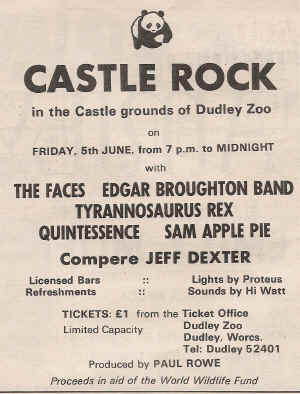 k for you for what you earn”. That can’t be unfair. If someone’s doing a bit of cleaning in a school for a few quid a week, then one day of that will secure my services, providing they put me up or find somewhere for me to sleep and feed me. So that was the basic thinking behind it. k for you for what you earn”. That can’t be unfair. If someone’s doing a bit of cleaning in a school for a few quid a week, then one day of that will secure my services, providing they put me up or find somewhere for me to sleep and feed me. So that was the basic thinking behind it.
It sounds fantastic. Are there any situations in which you might consider it uneconomical to agree to a gig, though, for example someone on income support living in the far North of Scotland?
Well it’s really simple, you see, they might be on income support, but they might say you know what, if I save up for say, 10 weeks, I could afford to give what I think equates to one day’s income. As long as they could get me a lift up to the North of Scotland then yeah, I’d do it. People have written to me a lot about this and I say to them it means what is says. If you earn £10 a day and you live in Ireland then as long as you can get me there and back, feed me and put me up then I’ll do it.
I’ve done one so far down in Somerset and it went really well, and I’ve got about 15 lined up from May.
So let’s get this straight, these are solo gigs, you, an acoustic guitar and a mic?
Not even a mic, it’s not necessary in a small room with a voice like mine (laughs). I’ve got this tiny, tiny, 2 watt Roland amplifier which is to die for, it’s so loud and it’s about that big and fits in my pocket virtually. It gives it that little bit extra because an acoustic guitar with my voice is not really loud enough.
Am I right then in thinking that the set list will lean more towards, say, “Evening Over Rooftops” than “Out Demons Out”?
Yes definitely and some new songs as well that I’ve written to actually cater to that type of environment.
The policy seems in sharp contrast to one of your contemporaries on Harvest, the very wonderful Roy Harper, 70 years old this year, and who I read was set to take part in a televised “legend” gig for which the organisers are charging several times his usual ticket price- £150 plus - in return for a champagne reception, a meet and greet and a personalised memento of the event. Is that something you would contemplate doing and if so are there any conditions you’d insist on if you did?
Well you can screw the champagne, and I don’t like the sound of that ticket price. Roy does what he does, he’s an old mate and I wouldn’t want to criticise him. I know I’m on my own in being a bit, you know, about this kind of thing. Have a look at Billy Bragg’s website and the tiny, tiny little bit of activism, and then ask yourself if you looked at it two years ago what’s changed. Barking, Barking, Barking, BNP, Barking, that’s Billy. I don’t know what else he does and I don’t get it. There’s nothing on his site about the march. Yes there’s Take Back Parliament, that’s a good one, but I don’t see any of the artists who I respect and have time for, and that includes Billy – he’s still a good bloke and his heart’s in the right place –putting themselves about and changing the status quo. If you pay 50 pence a week you can go and meet Billy at his sound checks (chuckles). Well if someone wants to come and meet me at my sound checks they don’t have to pay 50p a week to be in some Christmas club.
So having dealt with the novel concept of the solo gigs, what’s the prospect of getting the band back together again Blues Brothers – or should that be Broughton Brothers style - again?
I don’t think so, not really. It’s all gone a bit sour. Steve has a blog as well and when it all blew up he went into some detail about his version of events and I was seething because they weren’t my version of events or that of the majority of the band. Some things are personal, like you don’t have to talk about your divorce when you go to work, and just because you’re in a band doesn’t mean you have to tell everyone what’s going on. However the truth of the matter is that some members of the band took exception to my brother’s way of going about things, and then he had plenty of time before the next scheduled things to try and meet to do something about it. I would put it like this, because we’re brothers, and that includes everyone, I would maintain that there were two tasks to be addressed. One was to do something about the mess of men that we’d become, for our sakes and for our dignity, and for democracy, if you like, within a group of people who’d professed that. It seemed central to me that if we did nothing else we ought at least to have tried to sort out our differences and come to an understanding so that there was no acrimony and we were still brothers. The second task was that if we could do that then it was highly likely we would be able to keep the band together. Unfortunately nothing was done. So I think the likelihood of getting back together is very distant. I’ll be honest, my life is better. I don’t have the anxiety, I don’t have the stress that all that caused and so later this year I’m going to meet a couple of mates from the old days and put a three piece together with them if that works out maybe we’ll do live shows.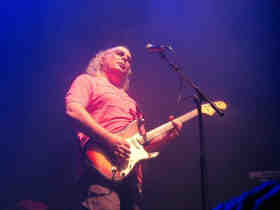
And what if it doesn’t work out?
Then I’ll just carry on what I’m doing now, solo.
So what are the other old band members are doing these days, do you know?
Well my son is writing his own material and has been anyway for quite some time. He will be doing some of these gigs with me – he’ll be at Glastonbury for instance. The other guys are working on their project called Sleep Thief which they record together. It’s quite strange really, because Arthur’s a bass player and he plays guitar, and Steve’s a drummer and he programmes bass and synths. He sings and writes the lyrics as well.
Eclectic, then?
Most certainly
Going back to the re-issue, if you could only take one of those Harvest albums with you to a desert island, what would be your Desert Island Disc?
“Oora”. No, no, I think it would probably be the Meat Album (self-titled 3rd album)
Good choice
I think so. Although I’d say that on the programme, and I’d get to the island and I’d probably never play it...
Edgar Broughton was interviewed in March 2011 by the indefatigable Ian Fraser. Interview, transcription & editing: Ian Fraser. Production: Phil McMullen
Here's a link to our 1989 interview with Edgar Broughton:
http://www.terrascope.co.uk/MyBackPages/EdgarBroughtonBand.htm
Finally, a review of the Edgar Broughton Band’s “The Harvest Years 1969-1973” Box Set on EMI Harvest records can be found here:
http://www.terrascope.co.uk/Reviews/Reviews_February_11.htm#EdgarBroughton
|

